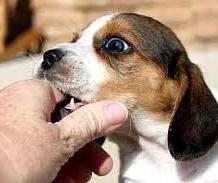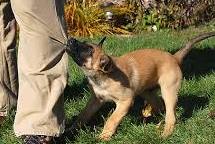Suppressing a behaviour by force is probably quite painful and your puppy may have temporarily stopped biting to avoid being hurt by you in the future. He will have no idea why he is being treated so roughly and there is no guarantee that the biting won’t happen later in life if, for instance, somebody accidentally steps on his tail.
Simultaneously uttering a guttural command or threat (e.g.,"No biting" = If you bite again I'll hurt you again, and for longer ) in English assumes your puppy is a mind reader or can miraculously understand whichever particular human language you used.
Nipping ankles or biting hands are invitations to play and when littermates continuously do so they mouth and bite each other all the time. If one puppy bites another too hard the game ends as the bitten puppy yelps and moves away; so if the biter wants to play again he needs to solve the problem himself by modifying the force of the bite and not to do it so hard the next time. This is a continuous and VERY necessary learning process throughout puppyhood, adolescence and adulthood.
Puppies that are taken away from their mother and littermates too early, e.g. at 5-6 weeks instead of 8-10 weeks, have insufficent time to learn how to play nicely and are therefore much more likely to nip and bite inappropriately. Single litter puppies are at an even greater disadvantage.

When a puppy leaves his mother and siblings he sees humans, especially small children, as his only playmates. We have sensitive skins and so need to teach our puppies that biting people is not acceptable. But for it to be a self-taught lesson, and therefore one remembered for the rest of life, this is best done if taught without force or fear. And it should taught from eight weeks of age - really good breeders do so even younger - in little steps while puppies still have sharp little teeth but weak jaws that can’t yet do serious damage.
So step one in teaching proper bite inhibition is that hard nips and bites end the game. Yelp indignantly, like another puppy would, and walk away to end the game without saying a word. The 'punishment' for the puppy is the removal of your attention and the game ending. Step two is that moderate bites end the game, step three is that light bites end the game and the final step is that touching human skin, even if accidentally as when puppies get overexcited, ends the game.

A shouted command
‘NO Biting’ might well startle a puppy so that he stops doing it but, no matter whether it is said in English or Swahili, it doesn't teach him what else to DO instead.
Any well intentioned person who advocates the use of force or shouting to prevent perfectly natural behaviours could get you and your dog into great trouble!
Your puppy, with his needle sharp teeth but weak jaws, will not be adequately educated in relation to having in-built good bite inhibition. He will soon become an adult dog with blunter teeth but much stronger jaws that are capable of inflicting serious damage.
If he bites it will be probably be a hard one hard because you followed incorrect advice and inadvertently prevented him from having the opportunity to learn to give an inhibited bite.
Puppies that have not learned bite inhibition may yet grow into much loved adult dogs and cause no harm for several years; however many of them quite unexpectedly do attack a child or adult and end up on the evening TV news. Because they had poor or no bite inhibition the damage can be severe and so they are generally destroyed the next day.

 A shouted command ‘NO Biting’ might well startle a puppy so that he stops doing it but, no matter whether it is said in English or Swahili, it doesn't teach him what else to DO instead.
A shouted command ‘NO Biting’ might well startle a puppy so that he stops doing it but, no matter whether it is said in English or Swahili, it doesn't teach him what else to DO instead.


